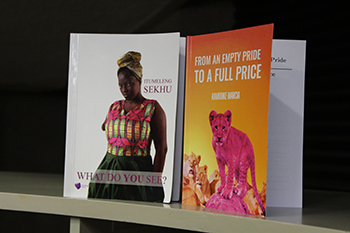Latest News Archive
Please select Category, Year, and then Month to display items
12 January 2024
|
Story Nonsindiswe Qwabe
|
Photo Sonia Small
 Since joining the UFS in 2008, Dr Grey Magaiza has worked extensively on approaches that can foster the socio-economic transformation of societies.
Since joining the UFS in 2008, Dr Grey Magaiza has worked extensively on approaches that can foster the socio-economic transformation of societies.
“The future should be one where communities can decide on their development agenda and futures. That’s the most important for me.” Dr Grey Magaiza, Deputy Director of the Centre for Gender and Africa Studies (CGAS) and Head of the Community Development programme on the Qwaqwa Campus, is passionate about capacitating communities to be agents of change and advancement. His vision for the future emphasises the empowerment of communities to take charge of their development by actively participating in decision making and the implementation of development projects that can improve their lives.
Since joining the UFS in 2008, Dr Magaiza has worked extensively on approaches that can foster the socio-economic transformation of societies. Over the years, he has crafted his research speciality into one that he is most proud of – being an interdisciplinary scientist immersed in the development of communities.
“I’m in a fortunate position of researching what I like. I say ‘fortunate’, because I’ve taken the time to understand what I’m passionate about, which is the overall field of rural livelihoods and livelihood futures – in short, community development. My research starts from an engaged university, understanding the elements that a university must use to enhance transformation and relevance to its immediate community in terms of development.”
One of the ways he has done this is by looking at social entrepreneurship as a development approach for young people in a rural setting. Through workshops with non-profit and civic organisations in Qwaqwa, Dr Magaiza has been helping these organisations to map out their needs and actively meet them through the involvement and support of external role players.
“We understand that communities are part of the national development agenda, but even that national agenda respects community knowledge and intentions and allows communities to shape their identity. A critical enabler of this is community organising. You bring back the capacity in communities to have dialogues on issues affecting them as spaces for engagement, knowledge exchange, and for people to just talk about their way forward.”
By enabling communities to define their development agenda, they can address their specific needs, challenges, and aspirations, he said. “When I look at livelihood futures, it’s quite an exciting aspect of my work – it’s like looking into a fortune tellers’ globe, because you’re not deciding for communities what they should do, but the communities themselves take those decisions.”
UFS Library book launch programme fosters dialogue between students and authors
2017-03-30

The University of the Free State (UFS) Sasol Library has hosted a series of book launches since 2016, bringing to the Bloemfontein Campus various new and seasoned authors who share their stories with the campus audiences. The Launch Your Book at the Library Programme hosted two authors on 23 March 2017, Itumeleng Sekhu and Marcia Ramodike. Both authors spoke about their life-changing experiences and shared their heart-wrenching stories, filled with courage and hope.
“Libraries must take the lead in creating dialogue, expression of ideas and inculcating a culture of reading and writing. This programme was also established to bridge the gap and find ways to encourage students to read and write, by creating a platform where they can interact with authors and see that people who write books are ordinary people with real stories to tell,” said Marcus Maphile, Assistant Director: Library Marketing and Community Engagement.
Speaking about her book, Itumeleng Sekhu described her experiences from childhood and her life as a disabled person after being severely burnt in a fire accident in her home as a baby. She said: “I tried to commit suicide several times because I had lost hope. Eventually after failing to do so, I realised at some point that it was time for me to let my light shine through.” She wrote her book, titled What Do You See?, which has received substantial media coverage, to encourage others who live with painful experiences, disabilities and what she terms “internal wounds”, hoping that her experiences could help to heal them.
Marcia Ramodike’s book, An Empty Pride to a Full Price, paints a picture of her life as a youth grappling with adult issues. She describes her pain after her mother’s death, and her constant battle with the legacy of the difficult socio-economic conditions she grew up in. When students asked Ramodike what she thought the right time was to write a book, she responded, “today is the right time to write your story”.
The UFS Library has hosted 16 book launches since 2016, with the biggest being the launch of Zubeida Jaffer’s book Beauty of the Heart. The programme aims to provide access to information and to share and debate ideas in support of democracy and freedom of speech.